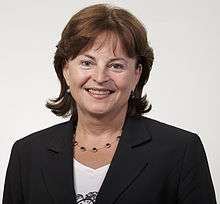Marlene Mortler
| Marlene Mortler | |
|---|---|
 Marlene Mortler in 2012 | |
| Member of the Bundestag | |
|
Assumed office 2002 | |
| Personal details | |
| Born |
16 October 1955 Lauf an der Pegnitz, Germany |
| Nationality | German |
Marlene Mortler (born 16 October 1955) is a German politician of the (Christian Social Union in Bavaria (CSU). She has been serving as Commissioner on Narcotic Drugs at the Federal Ministry of Health in the government of Chancellor Angela Merkel since January 2014.[1][2]
Life and career
Marlene Mortler attended the agricultural school in 1981, in Roth and gained a master's certificate. In 1983, she took over her parents' farm in Dehnberg with her husband and focused on the production of grain and renewable resources.
Mortler is Protestant, married since 1975 and mother of three children.
Political career
In 1989, Mortler joined the CSU, and in 1996, she became a member of the Women's Union.
From 1990 Mortler belonged to the district council of the district of Nürnberger Land. From 1996 to 2004 she served as first deputy district administrator of the district.
Member of Parliament, 2002–present
In the 2002 national elections, Mortler became a member of the German Bundestag. In the Bundestag, she is a full member of the Committee on Food and Agriculture and Deputy Member of the Committee on Tourism. From 2004 to 2005, she served as the CSU group's spokesperson on agricultural and consumer protection policies. From 2005 to 2009, she was the chairwoman of the Committee on Tourism. She was also the CDU/CSU parliamentary group's spokeswoman on tourism from 2009 until 2013.
In addition to her committee assignments, Mortler has been member of the German-Maltese and German-Hungarian Parliamentary Friendship Group since February 2010.
Since June 2009, Mortler has been serving as deputy chairwoman of the CSU district association Middle Franconia, and in October 2011 she was elected as a member of the CSU Board under then chairman Horst Seehofer. In November 2011, she was appointed chairwman of the party's working group on agriculture.[2]
Mortler has always been elected as a directly elected representatives of the Roth constituency in the Bundestag. In the 2005 elections, she received 51.0% of the vote.
Other activities
Regulatory agencies
∗ Bavarian Regulatory Authority for Commercial Broadcasting (BLM), Member of the Supervisory Board
Corporate boards
- QS Qualität und Sicherheit GmbH, Member of the Board of Trustees
Non-profit organizations
- Versicherungskammer Bayern, Member of the Agricultural Advisory Board (-2012)
From 1982 until 2004, Mortler served as chair of the rural women in the district Nürnberger Land and belonged from 1992 to 2012 as a district of the farmer Farmers Union Central Franconia and second deputy country farmer to the Bureau of the Bavarian Farmers Association (until 1997) on. From 1997 to 2012, she was the first deputy country farmer.
Political positions
In her role as a Commissioner on Narcotic Drugs, Mortler has been the target of diverse criticism. As an expert in agriculture she was criticized as unqualified for the position.
The German Cancer Aid has responded with praise to Mortler's initiative to ban tobacco advertising in Germany. Her initiative failed and nothing happened in this issue until April 2015. By 2014 they wanted to "hold intensive discussions in the federal government", she said in a Die Zeit article.[3]
By early 2015, Mortler came under heavy criticism which mostly arose from social media. Under the Twitter hashtag #Mortler[4] and on Facebook many concerned individuals and organizations voiced their discontent with the commissioner. A petition which called for her resignation garnered over 14,000 votes within a few days.[5] She was criticized for incompetence, an inappropriate qualification in "rural home economics" (German: Meisterin der Ländlichen Hauswirtschaft)[2][6] for the job, having a double standard (because of her promotion of alcohol consumption[7][8][9][10]) and a preoccupation concerning suggestions about cannabis legalization. A main point of criticism are her justifications for the illegality of cannabis in contrast to the legality of alcohol - in interviews she stated that (translated) "in contrast to Cannabis alcohol is part of our culture"[11] and "Because Cannabis is an illegal drug. Full stop."[9] In consequence to the criticism she closed her Facebook account.[12]
References
- ↑ "Bayerin kämpft gegen Crystal Meth & Co". Die Welt. Axel Springer. 13 January 2014.
- 1 2 3 "Die Drogenbeauftragte der Bundesregierung, Marlene Mortler". Retrieved 30 May 2015.
- ↑ "Bundesdrogenbeauftragte für Verbot von Tabakwerbung". Die Zeit. 29 June 2014.
"Noch in diesem Jahr möchte ich intensive Gespräche in der Bundesregierung darüber führen.", sagte Mortler der Nachrichtenagentur dpa in Berlin.
- ↑ "Twitter - Hashtag #Mortler". Retrieved 30 May 2015.
- ↑ David Sutthoff, Jan (25 March 2015). "Petition gegen Drogenbeauftragte Mortler: "Nicht qualifiziert genug – Belege gibt es zu genüge"". The Huffington Post. Retrieved 11 August 2015.
- ↑ "AbgeordnetenWatch - Marlene Mortler (CSU)". Retrieved 30 May 2015.
- ↑ "Marlene Mortler on Twitter, Kreuther Geist". Retrieved 30 May 2015.
- ↑ Woratschka, Rainer. "Neue Drogenbeauftragte Mortler - Eine vom Land". Der Tagesspiegel. Retrieved 30 May 2015.
- 1 2 Waack, Olli (16 May 2015). "Drogenbeauftragte Mortler gegen Cannabis-Freigabe: unhaltbare Behauptungen". Pirate Party Germany. Retrieved 30 May 2015.
- ↑ "Mortler at the "deutscher Brauer-Bund" (German Brewers' Association)". Retrieved 30 May 2015.
- ↑ "Eure Fragen an die Drogenbeauftragte - Jung & Naiv: Folge 182, at minute 8". Retrieved 30 May 2015.
- ↑ Rister, Florian (31 January 2015). "Drogenbeauftragte Marlene Mortler löscht ihren Facebook Account". Retrieved 30 May 2015.
External links
| Wikimedia Commons has media related to Marlene Mortler. |
- CSU Marlene Mortler on YouTube, Ein Porträt des Senders Franken TV, 2009
- Interview Marlene Mortler (CSU) on YouTube, Barrierefreier Tourismus in Deutschland, 8–10 June 2009